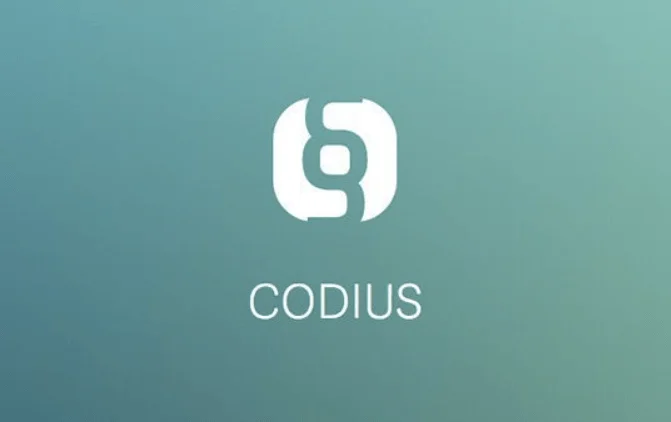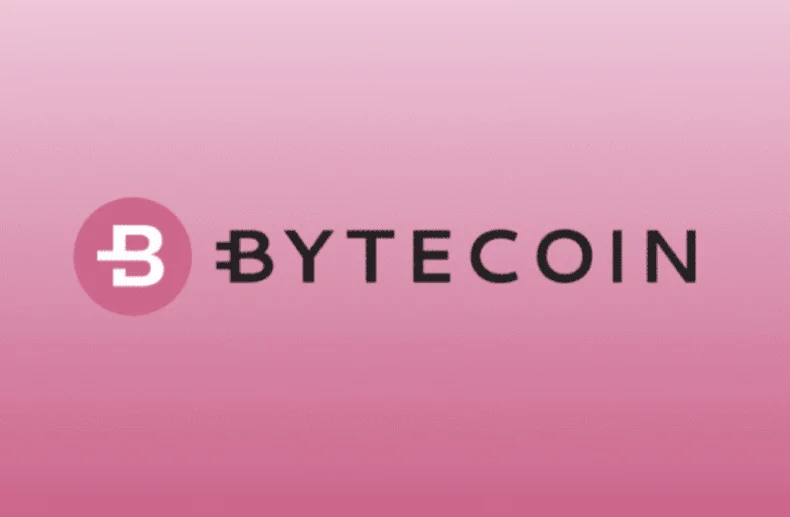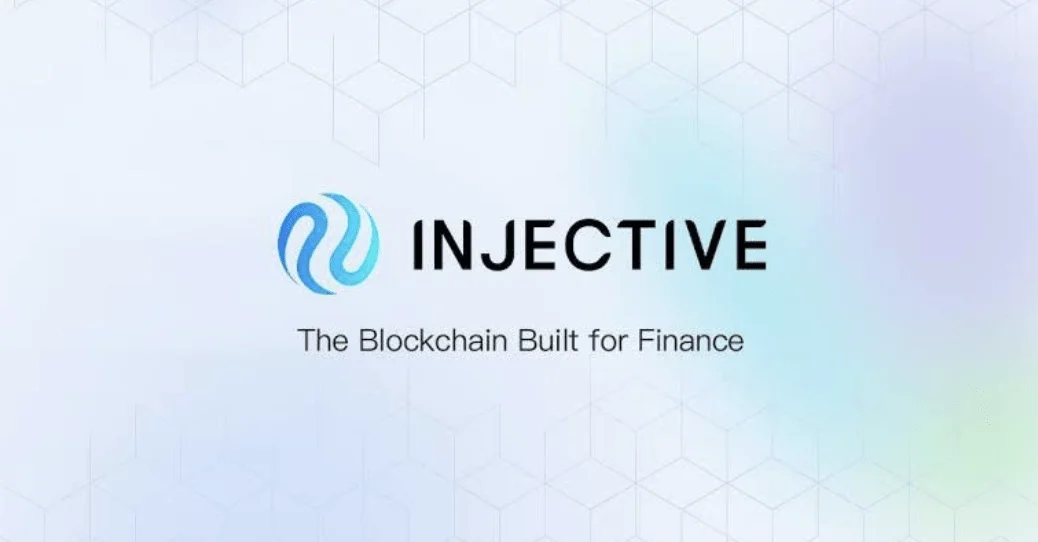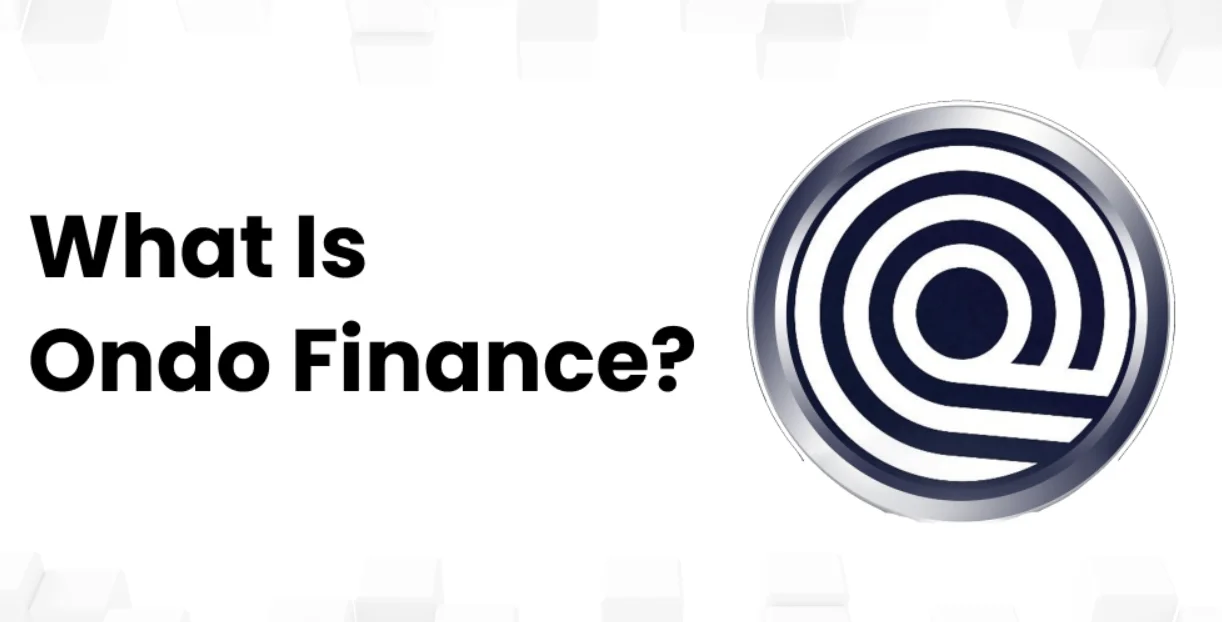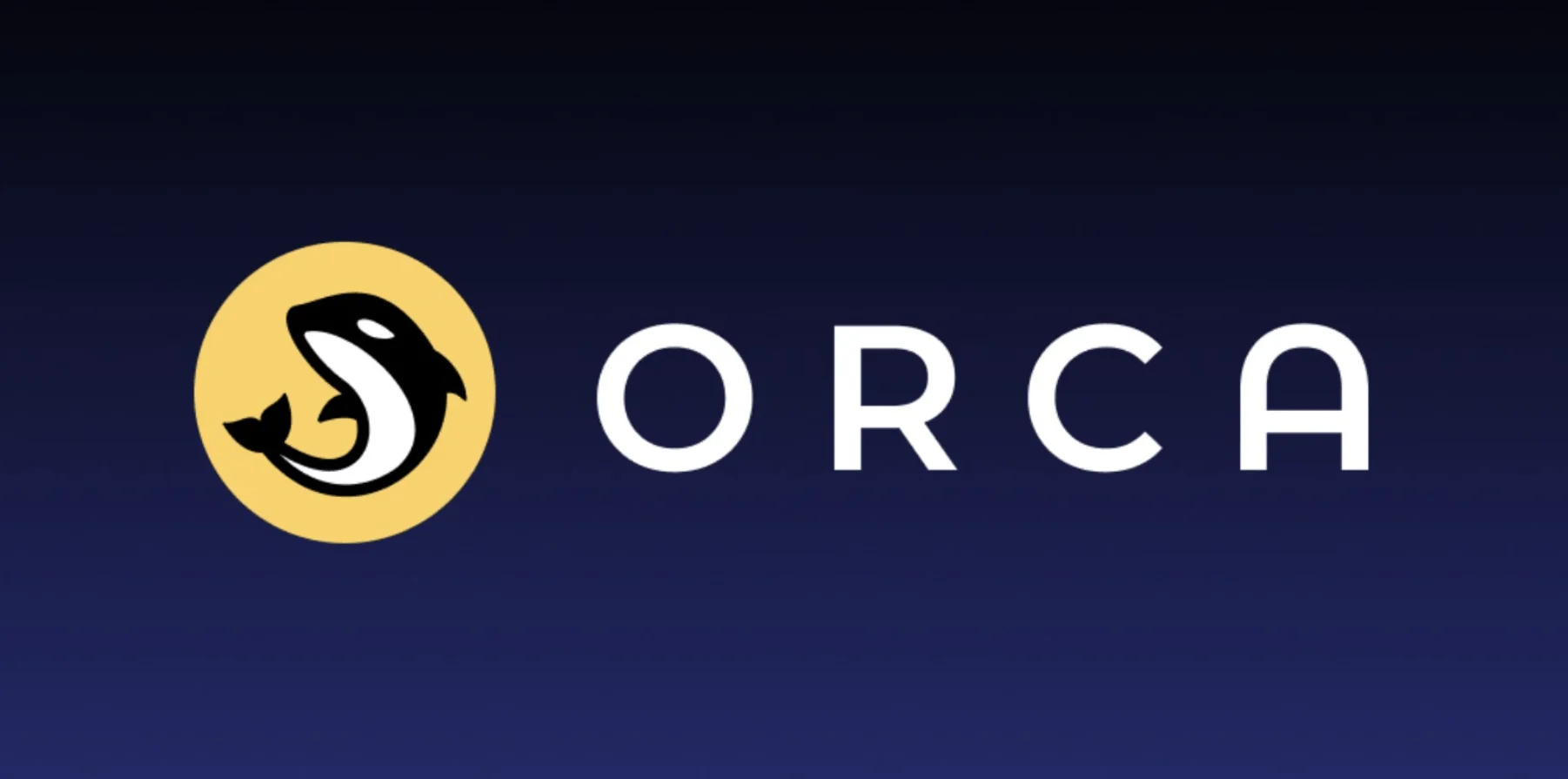TL;DR
- Codius Crypto introduces a revolutionary platform, changing how we think about and use smart contracts and decentralized applications.
- Utilizing containers, Codius allows developers to write smart contracts in any programming language, enhancing flexibility and security.
- Codius Crypto tackles scalability and interoperability issues, supporting seamless interactions across different blockchains and external systems.
- Initially, Codius faced adoption challenges due to its advanced and novel approach, but continued innovation has increased its appeal.
- Today, Codius finds use in finance, gaming, and beyond, with a growing community of developers building on its open-source platform.
- The future of Codius Crypto looks promising, with ongoing efforts to boost interoperability, community growth, and real-world application integration.
Table of Contents
Understanding Codius Crypto: An Introduction
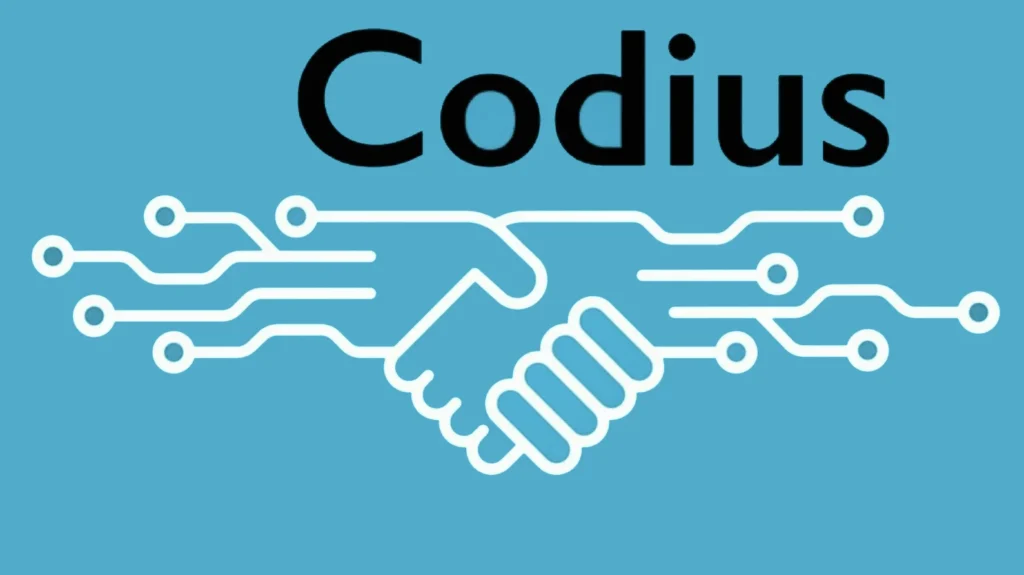
What is Codius Crypto?
Codius Crypto is a groundbreaking project started by Stefan Thomas, the former CTO of Ripple, aimed at revolutionizing the world of smart contracts and applications.
Unlike traditional platforms, Codius makes it simple for developers to create applications that are not only secure and distributed but also modular and constantly evolving.
These applications, or “smart programs,” can manage assets on various digital ledgers like Bitcoin and XRP, marking a new era in how we think about contracts and digital ownership.
The Vision Behind Codius Crypto
The vision of Codius was to build a more flexible and scalable platform for smart contract-distributed applications. By utilizing existing hosting providers instead of relying solely on a decentralized network, Codius aimed to solve the scalability and performance issues that often plague blockchain platforms.
It sought a middle ground, offering the decentralization benefits of blockchain while leveraging the practicality and reliability of traditional hosting services.
This inclusive approach meant developers could write contracts in any programming language and host applications off-chain, ensuring greater versatility and security.
Also read:
What is XDC Crypto? Explore XDC Network & Its Impact in Crypto
IMPT Crypto: Revolutionizing the Crypto World with Sustainable Investment
Codius vs. Traditional Smart Contract Platforms
Codius set itself apart from traditional platforms like Ethereum by prioritizing flexibility, scalability, and ease of integration.
Its unique approach allows smart programs to interact with any web service, operate at near-native speeds, and run in isolated environments to ensure security. Here’s a brief comparison:
| Feature | Codius | Ethereum |
|---|---|---|
| Scalability | High, thanks to off-chain execution and peer-to-peer hosting. | Limited by on-chain execution and network congestion. |
| Programming Languages | Any, offers flexibility to developers. | Primarily Solidity, requiring specific blockchain knowledge. |
| Interoperability | Built-in, with support for multiple digital ledgers and web services. | Limited, mainly focused on internal dApps ecosystem. |
| Security | Advanced sandboxing for app isolation. | Depends on smart contract coding practices and network security. |
| Cost | Potentially lower due to off-chain execution and competitive hosting. | Gas fees can be high, especially during network congestion. |
This comparison highlights Codius’s ambition to unlock a new paradigm in smart contract development, promising more scalable, secure, and user-friendly applications.
By addressing the limitations of traditional platforms, Codius aims to catalyze innovation in the blockchain space, making it an exciting prospect for developers and users alike.
Key Features and Technologies of Codius Crypto
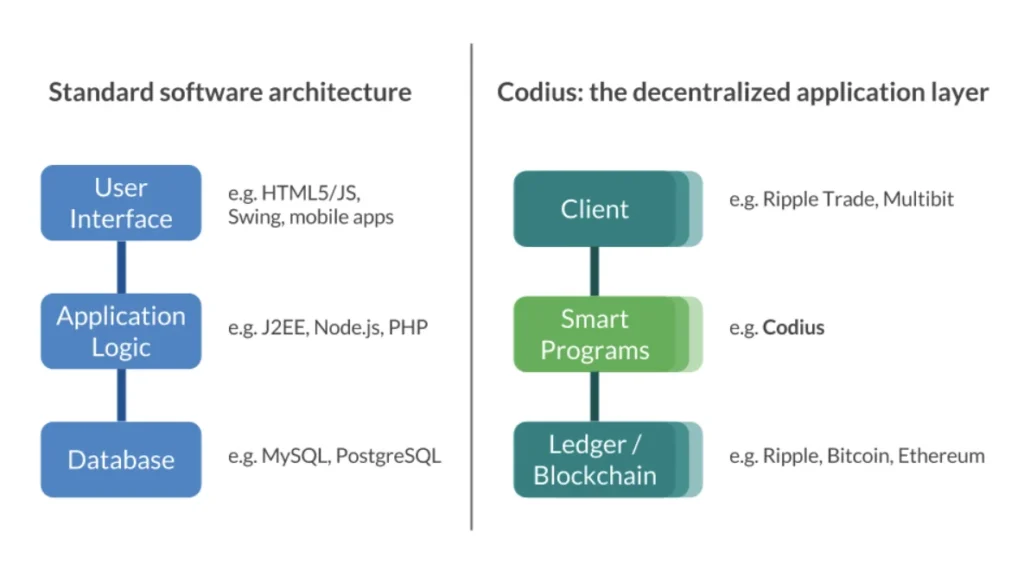
Codius Crypto brings a fresh perspective to the world of blockchain and smart contracts. It’s designed with the future in mind, offering solutions that tackle existing problems head-on. Let’s dive into what makes Codius stand out.
Decentralized Applications and Peer-to-Peer Hosting
Codius redefines the concept of decentralized applications (dApps) by employing peer-to-peer hosting. This means that instead of relying on a centralized server or a single blockchain, apps can run on multiple hosts distributed across the globe.
This approach not only enhances the security and uptime of the apps but also democratizes the hosting process, allowing anyone to participate as a host.
It’s a big leap toward truly decentralized digital infrastructure, making apps resilient and nearly unstoppable.
Smart Contracts Reimagined with Codius
Codius takes smart contracts to the next level. Traditionally, smart contracts are limited by the capabilities and constraints of the blockchain they operate on. Codius changes the game by enabling smart contracts to run in containerized environments.
This means developers can write smart contracts in any programming language they’re comfortable with, not just blockchain-specific ones like Solidity.
These contracts can interact with any blockchain or external data source, breaking down the barriers that have confined smart contracts to niche use cases.
The Role of Interledger Protocol in Codius Crypto
The Interledger Protocol (ILP) plays a crucial role in the ecosystem of Codius Crypto, acting as a bridge between different ledgers and payment systems. Here are some key points:
- Seamless Payments Across Blockchains: ILP enables Codius contracts to send and receive payments across various blockchains, making it ledger-agnostic.
- Micropayment Channels: It supports micropayments, opening up new possibilities for monetization strategies in apps and services.
- Enhanced Interoperability: By connecting different ledgers, ILP fosters a more interconnected and interoperable web, paving the way for true Web 3.0 experiences.
- Open Source and Decentralized: Just like Codius, ILP is open-source, promoting a collaborative and transparent development environment.
Together, Codius and ILP represent a powerful combination, pushing the boundaries of what’s possible with smart contracts and decentralized applications.
By addressing key challenges such as scalability, language restrictions, and interoperability, Codius is setting the stage for a new era of blockchain development.
Recommended for you:
Vaiot Crypto – VAI: Revolutionizing the Blockchain with AI
$ROE Crypto: Unveiling the Future of Finance and Blockchain
The Technical Backbone of Codius Crypto
Codius Crypto is not just another blockchain project; it’s a revolutionary step forward in smart contract technology. Its unique architecture, security features, and scalability solutions set it apart in the cryptocurrency world.
From Containers to Smart Contracts: Codius Architecture
Codius utilizes containers to revolutionize smart contracts. This approach allows developers to use any programming language to write their contracts, offering unprecedented flexibility.
Containers act like isolated environments, letting smart contracts run independently of the underlying blockchain. This means that contracts can operate across different blockchains, making Codius a versatile tool for developers.
The use of containers signifies a shift from the traditional, more rigid architectures, enabling more complex and useful applications.
Security and Isolation in Codius Applications
When it comes to digital assets and agreements, security is non-negotiable. Codius addresses this by ensuring that each smart contract runs in its own isolated environment.
This isolation prevents any malicious code from affecting other contracts or the host system. Codius’s architecture is designed with state-of-the-art sandboxing techniques, ensuring that applications are secure and resilient against attacks.
This level of security and isolation is crucial for maintaining trust in the ecosystem, especially when handling valuable digital assets or sensitive data.
Codius Crypto’s Approach to Scalability and Integration
Scalability often poses a significant challenge in the blockchain space, but Codius tackles this issue head-on. Its architecture is built to handle a vast number of transactions and contracts without compromising speed or reliability.
By leveraging off-chain computation and peer-to-peer hosting, Codius can scale dynamically based on demand. This flexibility ensures that applications remain fast and efficient, even as they grow.
Moreover, Codius is designed for seamless integration with existing systems. Its open-source nature encourages developers to build connectors and plugins, facilitating easy interaction between Codius smart contracts and external services.
This integration capacity is critical for real-world applications, where blockchain technology needs to interface with traditional financial systems, databases, and other digital services.
The Future of Codius Crypto and Its Impact on the Blockchain Ecosystem
Codius Crypto stands at the forefront of innovation in the blockchain space, promising to redefine how we think about smart contracts and decentralized applications.
Let’s explore the trajectory of Codius, the hurdles it has faced, and what the future might hold.
Challenges and Solutions: Why Did Codius Crypto Not Take Off Initially?
Codius initially faced several challenges that hindered its widespread adoption. The primary issue was the market’s readiness for such an advanced platform.
When Codius was introduced, the blockchain community was still grappling with the basics of cryptocurrencies and smart contracts. Additionally, the concept of using containers for smart contracts was novel and required a paradigm shift in thinking.
However, the Codius team, led by Stefan Thomas and supported by Ripple, did not see these challenges as roadblocks but rather as opportunities to innovate.
They continued to refine the platform, focusing on its unique advantages such as interoperability, scalability, and the ability to write in any programming language.
These solutions gradually began to resonate with the developer community, leading to renewed interest in what Codius could offer.
Codius Crypto Today: Use Cases and Developer Adoption
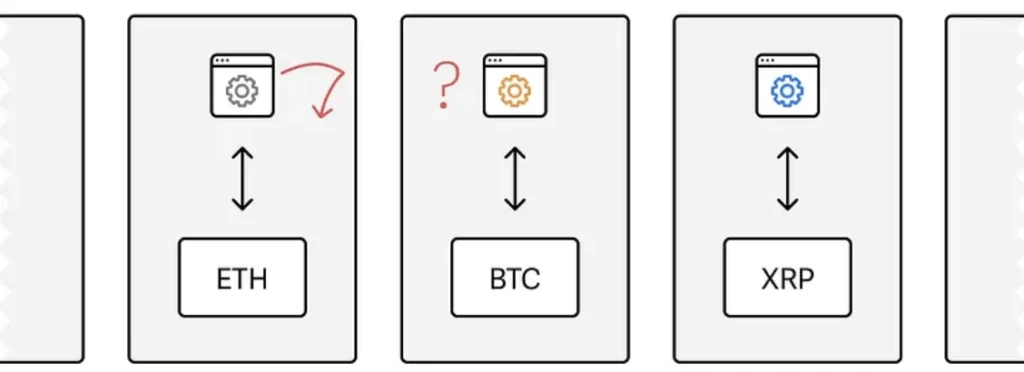
Today, Codius Crypto is gaining traction, finding applications in various sectors including finance, gaming, and social media.
Its ability to seamlessly integrate with different blockchains and external systems has made it particularly attractive for developers looking to build complex, cross-platform applications.
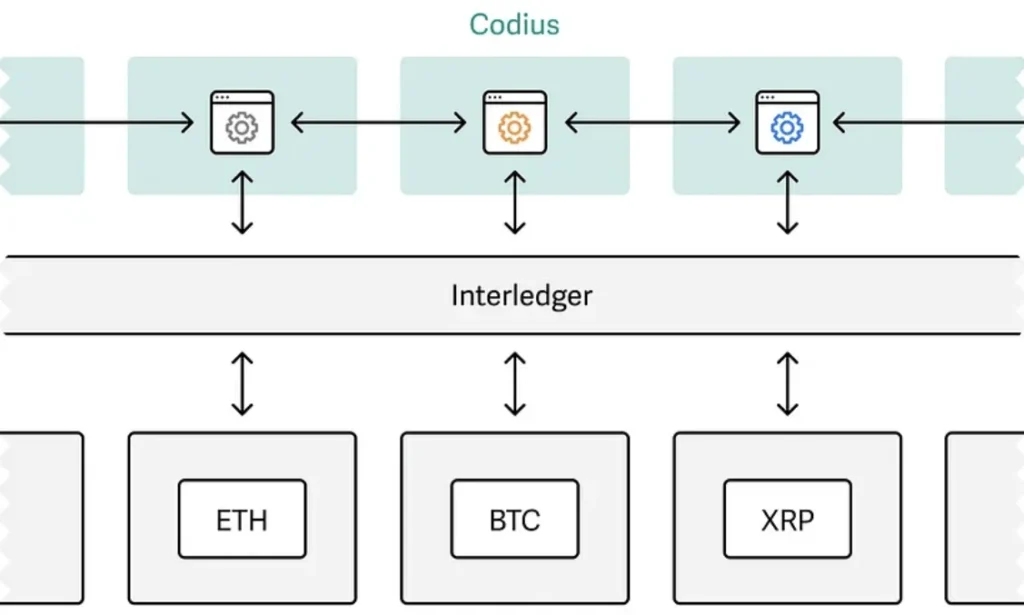
Use cases range from decentralized finance (DeFi) applications that leverage the XRP Ledger for fast, low-cost transactions, to gaming platforms that require secure, interoperable smart contracts to manage in-game assets across different blockchains.
The open-source nature of Codius has fostered a vibrant community on platforms like GitHub and Gitter, where developers share their projects, seek advice, and contribute to the platform’s growth.
What’s Next for Codius Crypto?
The future of Codius Crypto looks bright, with several developments on the horizon:
- Enhanced Interoperability: Efforts to further enhance Codius’s ability to interact with an even wider array of blockchains and digital assets are underway. This will open up new possibilities for decentralized applications and services.
- Growing Developer Community: As more developers discover the benefits of Codius, its ecosystem is expected to grow. This will lead to more innovative applications and use cases, further demonstrating the platform’s capabilities.
- Partnerships and Integration: Potential partnerships with major players in the tech and finance sectors could propel Codius into the mainstream, offering robust solutions to real-world problems.
Codius stands as a testament to the ongoing evolution of the blockchain space, demonstrating that with innovation and persistence, new ways to leverage blockchain technology can emerge, reshaping our digital landscape. As Codius continues to evolve, its impact on the blockchain ecosystem promises to be significant, ushering in a new era of smart contract functionality and decentralized application development.
